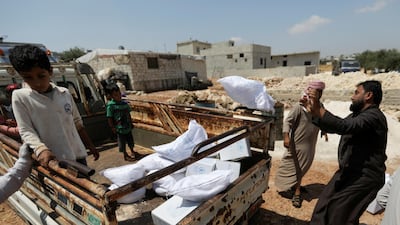The last remaining route for aid convoys into Syria could be shuttered within weeks, closing the door on a humanitarian lifeline for more than three million Syrians in the country’s rebel-held north-west.
The Bab Al Hawa checkpoint on the Turkey-Syria border is the last crossing with a UN mandate to let aid into the country -- and that mandate expires on July 10.
The US and others say the crossing should remain open and that the operation should be expanded.
But Russia, an ally of Syrian President Bashar Al Assad, says checkpoints are no longer needed and that aid should be managed from Damascus.
About 1,000 aid lorries pass through Bab Al Hawa each month. The UN’s aid chief Mark Lowcock and the heads of several other UN agencies say they are essential for providing assistance to 3.4 million Syrians, including 1 million children.
“A large-scale UN cross-border response for an additional 12 months remains essential to avert a humanitarian catastrophe,” Mr Lowcock and others said in a statement this week.
The UN first authorised cross-border aid operations into Syria in 2014 at four points – Bab Al Hawa between Turkey and Idlib, Bab Al Salam between Turkey and northern Syria, Al Ramtha near the Jordanian border and Al Yaroubia on the north-east frontier with Iraq.
Last year, the council cut that access down to only Bab Al Hawa due to opposition from Russia and China, veto-wielding members of the 15-nation Security Council.
The UN's top body is set to debate the crossings on Wednesday, the last public session on the issue before the mandate expires.
Russia says cross-border deliveries are no longer necessary and that aid should be overseen by Damascus, some of it passing across front lines with rebel forces.
Mr Lowcock says cross-line deliveries “could not replicate the size and scope of the cross-border operation".
“There is simply no alternative,” he wrote.
A resolution to extend approval of the cross-border aid operation needs nine votes in favour and no veto from any of the five permanent members – Russia, China, Britain, France and the US.
The US has pushed to further expand cross-border operations, while Russia has accused the US and Europe of politicising the humanitarian convoys.
US President Joe Biden and his Russian counterpart Vladimir Putin discussed the crossings at their summit in Geneva on June 16, but reportedly failed to break the deadlock on the issue.
The north-western Idlib region, accessible via Bab Al Hawa, is the last remaining rebel stronghold against the government of Mr Al Assad, who has largely regained control of Syria after a decade of civil war that has left the country and its economy in ruins.
David Miliband, a former UK foreign minister and chief executive of the International Rescue Committee, called for more cross-border aid to assist the 13 million Syrians in need of support.
“Reaching all Syrians in need via the most direct routes is not a political choice; it is a humanitarian imperative,” Mr Miliband said.
“The humanitarian case is clear and indisputable. These stark humanitarian realities must drive Security Council action on Syria.”


